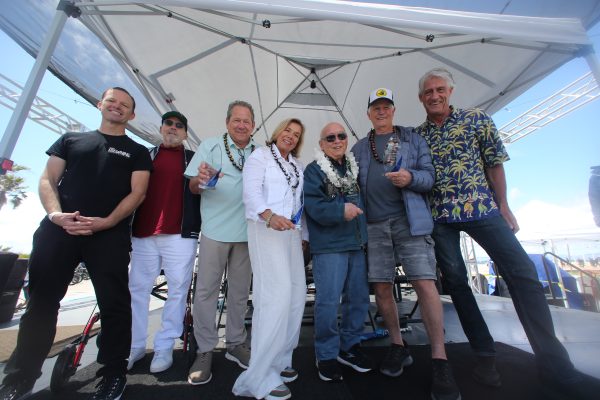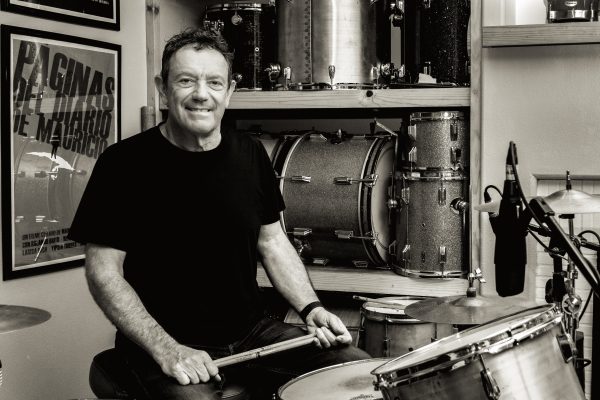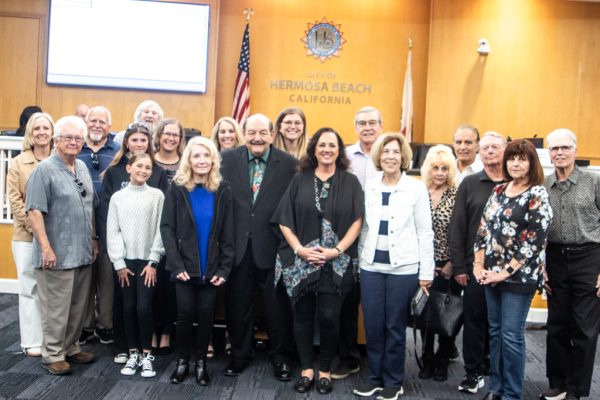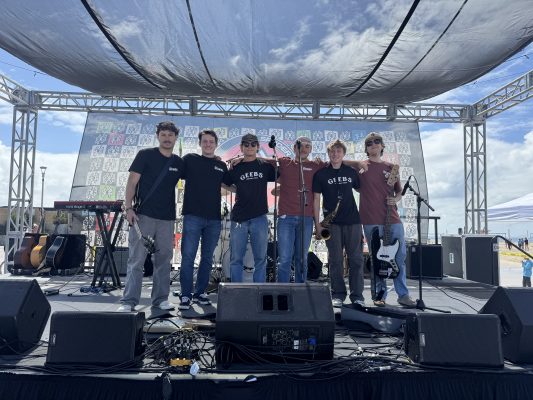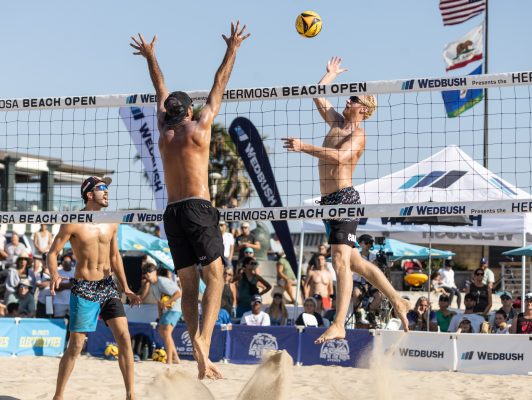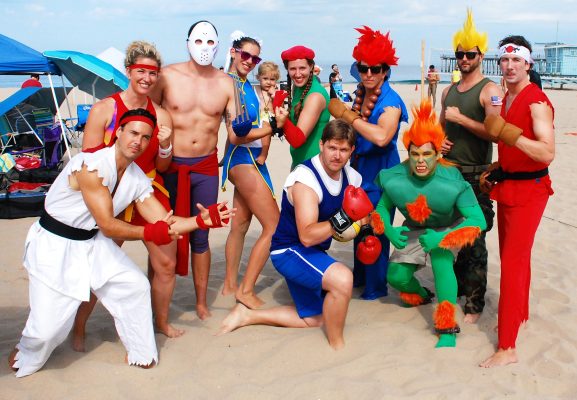by Kevin Cody
Last Wednesday morning, August 9, Scott Rusher sent a text to his surfing, and paddleboarding friends that read, “Aloha. So many great memories. I only have board shorts, sandals, T-shirt, and a pillow left.”
The brevity made the text’s gravity self-evident.
Rusher had been vacationing at the family home outside of Lahaina, Maui, with his wife Stacy, son Kalani, and Kalani’s girlfriend Kathryn. The home was gone now, along with an estimated 2,000 others homes destroyed by the deadliest U.S. fire in the last century. Nearly 100 were reported dead, and 1,000 missing. Lahaina, capital of the former Hawaiian kingdom, appeared to have been firebombed. Even the boats in Lahaina Harbor burned, including the Rushers’ 42-foot Benateau.
Wednesday evening, after having returned to their Manhattan Beach home, the Rushers received a text from Lahaina neighbor Andy Marchello that achingly echoed Scott’s text to friends that morning.
“Shirt, board shorts, sandals all that’s left,” the text read.
Unlike in the Rushers’ case, the home Andy, his wife Kristen, and their nine month old child lost wasn’t a vacation home.
Rusher looked in his closet and found six pairs of size 12 sandals, the same size Andy wears.
The following morning, the Rushers dropped a 50 pound box of everyday essentials, including the sandals, at the Manhattan Beach post office, and paid $350 to have it shipped overnight to their friends.
But that helped just one family. In their close-knit community of Puamana, a mile south of downtown Lahaina’s famous Banyan tree, over two dozen other friends had also lost their homes.
After going to the post office, Scott Rusher called Chris Brown, knowing Brown had a wide range of Hawaiian friends, a large social media following, and experience in relief operations. Brown is president of the California Beach Volleyball Association, and a Jimmy Miller Foundation Board Member.

Stacy Rusher, who works at Waterleaf Home in downtown Manhattan, contacted Jill Lampkin to enlist her help in the relief effort. Lampkin heads the Manhattan Beach Downtown Business and Professional Association. Their daughters played volleyball together at Mira Costa.
Manhattan Beach-based Skechers, who had a store on Front Street, in Lahaina, also joined the relief effort by contributing $250,000 to the Maui Strong Fund, along with 20,000 pairs of shoes, and 20,000 apparel items. Skechers employees gathered personal items for the fire victims.
For the Rushers the relief effort was a distraction from their personal losses. Scott’s father Dave bought his Puamana home in 1979. Scott bought his in 2017. He is the third generation owner of Rusher Air, which has 54 employees.
“I’d step off the plane at the Kahului Airport and the stress was gone,” Scott said. He spent the two weeks preceding the fire training for the upcoming Catalina Classic, a 32-mile paddleboard race he has competed in for the past 18 consecutive years.
He lost two paddleboards and 11 surfboards in the fire. When his wallet burned, it had $2,000 in cash, and more importantly, a funeral card he carried for nearly 40 years, in memory of childhood classmate John Shanahan.
For Stacy, the losses were equally personal, including family photos, and four decades of art, all chosen for personal associations.

No warning
Like others on Maui last Tuesday, August 8, the Rushers went to bed unconcerned.
Hurricane Dora was nearly 500 miles south of the island, and appeared less threatening than any of the six Hawaiian hurricanes the family had previously experienced.
“We stayed up for the 10 p.m. television weather report, and all it said was a wind advisory was expected to last through Tuesday afternoon,” Scott said.
He awoke about 4:45 a.m. when the ceiling fan stopped. The power was out, and the wind whooshed louder than the reported 60 miles an hour.
Kalani told his parents a 15-foot tall plumeria had been uprooted and slammed into the side of their home.
“Plumerias have shallow roots. We weren’t concerned,” Scott recalled.
But as a precaution, he decided to take down their patio umbrella, and walk the property.
He videoed the bowing palm trees. Then, when he tried to share them with the property management, he discovered he had no cell service, and the internet was down.

As the sun rose, he walked to the nearby, waterfront home of Palos Verdes residents Andy and Kathy Patman. Their son Matthew is Kalani’s age.
They had decided to fire up their propane barbecue to boil water for coffee and cook breakfast.
The two families ate barbecued eggs, and Portuguese sausage, accompanied by fresh pineapple, mango and papaya. They passed the time playing Rummikub, and watching the ocean.
“We counted nine water spouts. I’ve never seen the ocean look so violent. Mango tree branches were breaking off, palm fronds were flying all over, skylights were being ripped off roofs. We hung out ‘til 3 p.m., and still the wind wasn’t dropping like the night news had predicted,” Scott said.
“I went to my car to get a weather update on the radio. There were no weather reports on AM or FM,” he said.
Scott’s family went home to nap. He stayed outside to video the wind.
“I videoed to the east, south, west and then north. At 3:50 p.m., looking north, I saw smoke, and walked down to the water to get a clearer view. By the time I resumed videoing at 3:51, the cloud of smoke had doubled in size.”
According to official reports, the Lahaina fire started at 3:30 p.m.
“It looked like Malibu when it burns, viewed from the South Bay. Lots of smoke and a glow along the ridge,” Scott said.
“I went back to the house and told everyone to grab their things. We’re driving south.” He took his driver’s license, and credit card from his wallet.
The wind was blowing hard north, away from Puamana, and Lahaina, and towards Kaanapali.
Scott’s concern was the former sugar cane field across the Pali Highway from Puamana. It was carpeted by an invasive grass that grows tall with the spring rains and turns to tinder during the dry summers. The Pali Highway runs north, and south, and was their only way out.
“If a fire starts in the south, we don’t want to be caught in the middle,” he told his family. Kathryn grabbed her suitcase because she was scheduled to fly out the next morning. The others grabbed the bare essentials, and nine gallons of water. They expected to be back in their beds that evening. But in case they weren’t, Scott also grabbed his pillow, a running joke with his paddleboard friends because he brings the pillow to Catalina Island to sleep on the night before the Classic.
“I wanted to be comfortable in case we had to sleep in the car,” he said.
The family drove south about two miles, and parallel parked in an open area by the beach. The wind started rocking their Toyota FJ Cruiser so violently they were afraid it would tip over.
So Scott re-parked the boxy FJ, stern to the wind, like a sailboat in unprotected waters.
Shortly after they parked, about 5 p.m., another car parked alongside them.
“The driver got out, wild eyed. He said he needed water. We told him, ‘No problem, we have water.’ And we gave him some food.”
“He said his house burned down. He lived on Lahainaluna, the road that leads up the hill from Lahaina to the high school. He said he had a minute’s notice, and the whole hillside was burning, and Lahaina was next.
“I’m thinking the guy’s in shock, and the fire will get knocked down,” Scott said.
“At 6 p.m. the Mayor of Maui comes on the radio. He says to stay away from downed power lines, and let the fire department do its job. He says nothing of value, like how fast the fire is moving, or where to evacuate to. He says for more information, go to MauiNow.com., ignoring the fact there was no internet.”
Scott drove his family a few miles further south, in increasingly heavy traffic. Shortly after midnight the family drove back to Puamana, in hopes of retrieving their wallets and other essentials. Scott said he still wasn’t concerned about Puamana, but he was concerned about Lahaina.
Police made them turn around.
“We started seeing people walking south, some with suitcases, some with nothing. Some barefoot. That scared me,” Scott said.
At 4:30 a.m., after having parked again on the side of the road, the family was awakened when Scott’s head hit the horn.
Since everyone was awake, they made a second attempt to return to their home, and were turned back a second time by police.
“There’s still no cell service. There’s no news on the radio. We have no idea what has happened to Lahaina, or Puamana,” Scott said.
Rather than sit in their car another day, they decided to drive Kalani and Kathryn to the Kahului Airport on the other side of the island.
After seeing them off, Scott and Stacy ran into friends in a market and were invited to their parents’ nearby home.
“We were still expecting to return to Puamana that evening, until we saw the helicopter video,” Scott said.
The video showed Lahaina gone. Puamana was mostly gone.
“Our friend stopped the video, and said it looks like your home is okay. I said that isn’t our home. We’re over here, and it’s gone.”
The family took some consolation in seeing Scott’s dad’s home and the Patmans’ home still standing.
The Rushers declined their friends’ offer to stay the night.
“We booked an evening flight, but went back to the airport at noon because we had no idea what kind of madhouse it might be. Plus it had cell service, restrooms, air conditioning and food,” Scott said.
Shortly after arriving at the airport, they talked their way onto a Delta flight that had been delayed. During the drive home from LAX, a friend sent them a photo of Puamana. All that stood where their home had been was a single cinder block wall.

Back to work
By the end of that Thursday, August 10, just hours after the Rushers’ relief effort began, the Rusher Air lobby in Lawndale, and Waterleaf’s design room in Metlox Plaza were overflowing with donations. Brown had secured U.S.A. Olympics Beach Volleyball apparel from local Olympians, and surf apparel from local surf shops. Lamkin had solicited donations from half a dozen downtown Manhattan Beach shops, including Tabula Rasa, Marine Layer, and Go Gently Nation. Residents thinned out their closets and cupboards, and made runs to local stores to purchase contributions. The Rushers’ 21st street neighbor, Jane Reitz, rallied other neighbors. Barry and Kathy Fisher from GROW market donated non-perishable food.
Manhattan Beach Mayor Richard Montgomery put the community’s response in historical perspective.
“In years past, the Manhattan Beach community has organized relief efforts for people in Mississippi, Louisiana, and Texas after those communities experienced devastating hurricanes. We are going to rally once again for the people of Hawaii.”
“Broken hearted,” Scott wrote in a text to friends last Wednesday evening, after his family arrived home.
“Very grateful,” he wrote in a text to friends last Thursday evening.
Donations for Maui fire victims may be dropped off at Rusher Air, 4435 W. 153rd Street, Lawndale; until Thursday, August 17. ER


